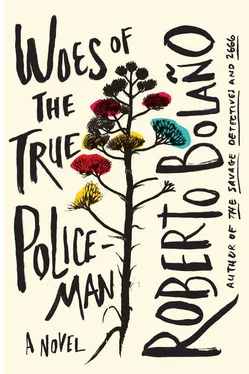“You took it like a man, darling,” said the whore.
“Five hours later Don Pedro Negrete arrived and the policemen stood to attention. Don Pedro came in with a smile on his face and his hands in his pockets, like he had all the time in the world and he didn’t mind coming in to the station on a Saturday night. Who put this boy in the tank? he asked without raising his voice. The deputies who were questioning me pissed themselves they were so scared. Me, boss, said one. Ay , Ramírez, you really fucked up this time, said Don Pedro, and Ramírez almost threw himself at his feet to kiss them, no, Don Pedro, it was just routine, I swear, Don Pedro, we never laid a finger on him, ask him, for the love of God, Don Pedro, and Don Pedro looked down at the ground, looked at me, looked around at the other policemen, ay , Ramírez, Don Pedro laughed, ay , Ramírez, and everyone except for me started to laugh, too, they were starting to recover, relax, and they laughed, they laughed at poor Ramírez, man, you’re in the shit now and Ramírez gave each of them a look, one by one, like he was saying have you all gone crazy? and then even I laughed, and that poor dumbshit Ramírez finally laughed a little too. And now that I think of it, the laughing sounded strange, it was laughing but it was something else too. You’ve never heard a bunch of cops laughing at another cop in an interrogation room. It was a kind of onion laugh. The bad boy inside each of them laughed and the onion burned away little by little. The laughs echoed off the damp walls. The onions were small and fierce. And to me it felt like a welcome or a celebration.”
“I like to hear one cop laugh, not a lot of cops all together, sugar,” said the whore.
“Gumaro, who was leaning in the doorway and who I hadn’t noticed until then, laughing. Don Pedro Negrete laughing, which was like the laughter of God and smelled like whiskey and expensive cigarettes. And all the laughing from the men who were about to be my crew, finding it honest-to-God funny, the beating that son of a bitch Ramírez was going to take.”
“I think I know the Ramírez you’re talking about, love,” said the whore.
“I don’t think so, Ramírez died before you got here. He tried to get Don Gabriel Salazar to hire him, but it didn’t work. Don Gabriel wanted me, but Don Pedro Negrete told him he couldn’t have me, he’d had his chance and now he’d lost it, he’d put me with two faggots who weren’t worth even a bullet in the back of the head, his man Pat Cochrane was worthless, and I wouldn’t be coming back. I gave you the boy, Gabriel, he said, and you almost got him killed. This time I’m keeping him. That was how I quit working for Don Gabriel Salazar. Don Gabriel wasn’t too happy with Don Pedro’s explanation, but when he said goodbye to me he gave me an envelope of money, from his wife, he said, who’d been a wreck for a week but who was still grateful for my services. With the money, I bought myself clothes and rented an apartment in Colonia El Milagro, on the south side of Santa Teresa.”
“You’ve never invited me to your apartment, sugar,” said the whore.
“It was my first place and it’s still the only place I’ve ever had. It’s on the third floor and it has a dining room, a kitchen, a bathroom, and a bedroom. It doesn’t get any light, which for me is an advantage because I usually sleep during the day and I like the dark. When I turned eighteen I bought myself a ’74 Ford Mustang. It was an old car, but it was pretty and the engine had been tuned. You could say that it was almost a gift. One good turn deserves another, Pancho, they told me, and I said okay.”
Pedro and Pablo Negrete were born in Santa Teresa in 1930. To the surprise of their family and the amusement of the neighbors they turned out to be monozygotic twins. Until they were sixteen they were identical and only their mother could tell them apart. Then life changed the brothers radically, though beneath the surface a keen student of human physiognomy could see that their physical differences were like the reaction of each to the other. Thus, Pedro’s mustache and Pedro’s eyes, his strong hands, his steady pulse, his gut, the belly of a man who likes his food and drink, found their perfect counterpart, their ultimate elucidation, in the bloodless lips and thick glasses that Pablo had been stuck with since his sixteenth birthday, his manicured hands and his flat and ulcer-plagued stomach. Until well into adolescence both were of medium height, thin, dark, mild-looking. Then Pablo grew two inches taller than his brother and acquired a perennial expression of perplexity. Pedro, in contrast, remained the same height — in fact, as he got fatter he seemed to shrink — but his features grew stronger and his face filled out and his meekness was exchanged for an effortless congeniality, a deceptive congeniality that actually inspired respect or fear. By the time they were seventeen they were completely different. Pablo decided that he wanted to go to college and Pedro joined the Santa Teresa police force, thanks to the good offices of an uncle who was a sergeant. It was the first time that the twins had been apart.
Pedro, shoehorned into a shiny blue uniform, spent his days wandering Colonia Juárez, especially Calle Mina, home to streetwalkers and the strangest stores in the city: hardware shops that looked like gunsmiths’ shops, gunsmiths’ shops that looked like jails, doctors’ offices that cured impotence and all kinds of venereal diseases, tiny bookstores where mystery novels, romance novels, and books about World War II overflowed onto the sidewalk, taxidermist shops that displayed leopards and eagles on their high, dark shelves, cantinas and pulquerías frequented by shady-looking characters.
Pablo, meanwhile, embarked on the study of law and at night he washed dishes at an Italian restaurant on Calle Veracruz, between Colonia Escobedo and Colonia Juárez. The owner was a former teacher of his, a professor of rhetoric, and the restaurant was the only Italian spot in Santa Teresa, at least in those days. Later there were pizzerias and hamburger joints and even soda fountains, everything to suit the tastes of a modern city, but back then there was only one Italian restaurant, one Basque-French restaurant, and three Chinese holes-in-the-wall. Everywhere else the food was Mexican.
The first years weren’t easy. A certain tendency toward melancholy and a reasonably happy childhood did nothing to prepare the two brothers for the world of work, but at the core they were tough and they soldiered on. Little by little they got ahead and managed to adapt to their circumstances. Although Pablo Negrete soon realized that the law bored him more than it interested him, a small amount of scheming got him his degree and a scholarship to study philosophy in the capital. Pedro, meanwhile, furnished sufficient proof of his courage as a police officer and a man, but most of all of his exquisite nose and tactful handling of the people who mattered. Quietly he rose through the ranks of the Santa Teresa police department. His superiors respected him and his subordinates half loved and half feared him. It was around this time that all kinds of gossip about him began to spread. It was said that he had slit the throat of a whore in her hotel room, that he had killed a leader of the railroad union (though the train didn’t pass through Santa Teresa), that for the benefit of a local rancher he had engineered the disappearance of five seasonal workers clamoring for what they were owed. But nothing could ever be proved.
Pablo completed his philosophy degree with a thesis titled Heidegger and Mexican Thought , which some fellow students and professors judged to be in the great critical tradition and that was actually tossed off in twenty-five days, plagiarized from all kinds of sources, by the Michoacán poet Orestes Gullón, who three years later would die of cirrhosis of the liver. Gullón, reporter for El Nacional , author of slanderous palindromes and acrostics, as well as poems occasionally published in a few Mexico City journals and provincial newspapers, was Pablo Negrete’s one friend during his profitable and happy time in the capital; serious-minded and polite, he knew how to avoid making enemies, but his only real friend was Gullón. With the latter he spent time at Café La Habana, on Calle Bucareli, and at the bar La Encrucijada, on Bucareli at Victoria, and at some dubious dance halls on Avenida Guerrero.
Читать дальше








![О Генри - Бляха полицейского О’Руна [The Badge of Policeman O'Roon]](/books/405347/o-genri-blyaha-policejskogo-o-runa-the-badge-of-po-thumb.webp)



